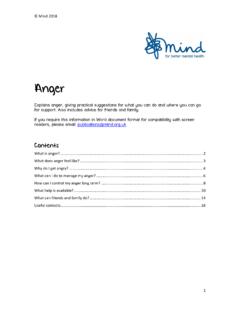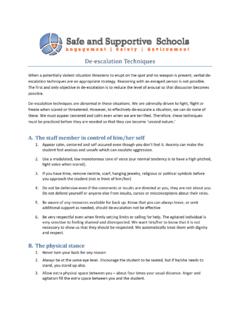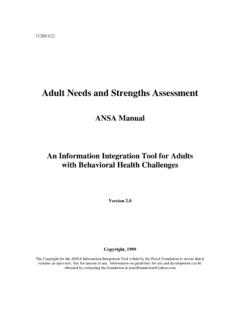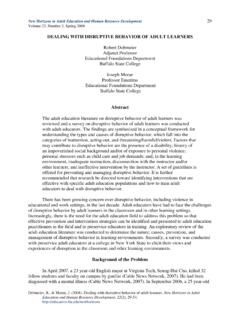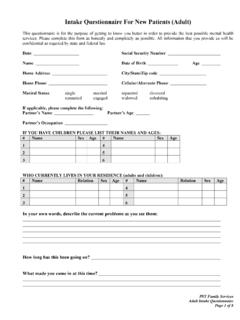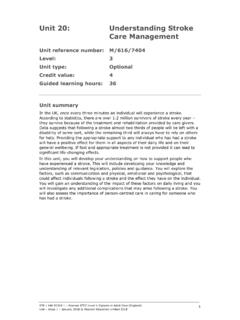Transcription of Anger Management: Emotional Outbursts and Teenage …
1 Anger Management: Emotional Outbursts and Teenage DefianceRecognizing when your teen s Anger is out of controlContentsOverview 3 Anger Managment: Emotional Outbursts and Teenage Defiance 4 Normal Teenage Emotions vs Problematic Anger 5 Signs Your Teen s Anger Is Out of Control 6 Ways to Help Your Teen Control Their Anger 7 The Importance of Early Intervention 8 Effective Treatment Options 8 What is Wilderness Therapy and How Does it Help Teens?
2 9 How to Support Your Teen Through Wilderness Therapy 11 Conclusion 12 Resources this white paper, we discuss Anger issues, Outbursts , and defiance in teenagers, signs that your teen s Anger is out of control, and provide an overview of treatment options. We focus on wilderness therapy, because it represents a full behavioral and clinical white paper is written for parents and guardians of teens struggling with Anger , defiance, and Emotional Outbursts , with the intention of providing solutions and resources for families of adolescents struggling with behavioral, psychological or Emotional Anger Management: Emotional Outbursts and Teenage Defiance Let s face it, the Teenage years are notoriously difficult years for parents and children alike.
3 Hormones are raging, boundaries are being tested, and adolescents are making their first steps into adult privileges and responsibilities. While some parent-child conflict is normal during the Teenage years, there comes a point where Anger turns from a valid Emotional response into a level of turmoil that should be addressed promptly. Anger is part of our Emotional spectrum, and is a normal, healthy Emotional response to outside stressors. In fact, Anger helps us to deal with threats when we feel crossed or challenged. It is when we let our emotions effect our actions that Anger can become harmful in teens. In fact, according to Harvard Medical School, nearly two-thirds of adolescents have experienced an Anger attack involving threatening violence, engaging in violence, or destroying property at some point in their lives.
4 Even more alarming is the fact that nearly eight percent of these adolescents have regular Outbursts like these. Normal Teenage Emotions vs. Problematic Anger , Outbursts , and Defiance Signs Your Teen s Anger Is Out of Control Ways to Help Your Teen Control Their Anger The Importance of Early Intervention Effective Treatment Options What is Wilderness Therapy and How Does It Help Teens with Anger ? How to Support Your Teen Through Treatment4 Anger Management: Emotional Outbursts and Teenage DefianceOUTBACK TREATMENTN ormal Teenage Emotions vs Problematic Anger , Outbursts , and DefianceThe Teenage years can be rough: growing up, changing hormones, grappling for more independence with parents, new privileges, and taking on new responsibilities.
5 This can be overwhelming for teens. It is completely normal for teens to be moody, and even angry during these years. While it is normal for teens to experience Anger , lashing out (making verbal threats, becoming destructive, or physical violence) is often a cry for help. There are some situations where Anger and Emotional Outbursts go beyond the scope of growing pains and typical teen angst. Some teens are better equipped emotionally to deal with Anger in a healthy way and some need a little more help. Other teens experience problematic Anger due to an unresolved mental health issue, frustration/anxiety from an uncontrollable life experience, or from crumbling under the added pressure that comes along with growing up. There are a number of issues that can trigger extreme Emotional Outbursts , Anger , and defiance in teens:LOW SELF ESTEEM - When teens are down on themselves, feelings of hurt and Anger can build up inside them.
6 This can lead to Emotional Outbursts and acts of FROM PEERS - Teens who experience bullying can often experience feelings of social isolation, loneliness, anxiety, low self esteem, and fear. This can be a traumatic experience during the formative years of one s life. Since many teens do not have the coping skills to deal with these feelings, some with lash out with Anger and Emotional Outbursts . AN UNRESOLVED FAMILY CONFLICT - Some teens are not emotionally equipped to deal with a major family conflict or trauma, such as divorce, abuse, or issues stemming from adoption. Even adults have trouble dealing with these issues. Since teens do not know how to cope with the negative feelings associated with these situations, some will experience angry Outbursts and will commit acts of defiance as (unhealthy) ways to cope with things that are out of their control.
7 GRIEF - Because Anger is one of the stages of grief, it is only natural for a teen who has lost a friend or family member to feel some Anger . Some teens, however, experience difficulties moving past this stage, especially when it is a traumatic loss of someone very close to him or her. DEVELOPMENTAL OR NEUROLOGICAL ISSUE - ( ADHD, Autism Spectrum Disorder, Oppositional Defiant Disorder.) Teens who have neuro-developmental issues such as these can have problems problems with a lack of self awareness/self control, impulse control, social skill deficits, and difficulties managing/handling emotions, especially Anger . In addition, these teens can be more sensitive to sensory information from the outside world, causing them to become easily overwhelmed or overstimulated.
8 DEPRESSION - Teens and adults display signs and symptoms of depression very differently. Although an adult who is depressed will likely appear sad, many teens with an undiagnosed form of depression is much more prone to Emotional Outbursts , frustration, and hostility. ANXIETY - Some teens who seem defiant or experience Emotional Outbursts are actually struggling with anxiety. Since depression and anxiety are often associated as adult problems, these can go undiagnosed in children and teens. This is a misconception, as anxiety and depression can appear during adolescence. 5 WWW OUTBACKTREATMENT COMTHE PRESSURE/STRESS OF Teenage LIFE - When children transition into their Teenage years, there is an increased pressure to perform well in school, get into college, play well in sports, do well on tests, Anger is a normal Emotional response to outside stressors, teens need to learn healthy coping mechanisms now, before they reach adulthood.
9 Teens need to know that it is not wrong or bad to feel angry, but that they cannot let the Anger consume them or control their actions. This is vital to ensuring that your child s Anger remains a valid Emotional reaction rather than escalating into violence, defiant behavior, or rage. Signs Your Teen s Anger Is Out of ControlSometimes, as a parent, you are so close to the situation that it is difficult to be objective about your child s Anger issues. Some parents are quick to brush off Anger as a normal part of the Teenage experience, while others grow very concerned over Emotional Outbursts and acts of defiance. Remember that Anger is a normal, healthy response that is innate in human nature, and is actually part of the fight or flight response.
10 Yelling, arguing, name-calling, and crying can all be normal Teenage responses to Anger -- so long as they do not escalate to violence or rage. However, if your child regularly experiences the red flag signs below, his or her Anger issues may need to be addressed:RED FLAG SIGNS OF PROBLEMATIC Anger Getting into physical fights at school or at home with siblings Excessive arguing with parents, teachers, peers, siblings, etc. Excessive Emotional Outbursts and rage Frequent irritability Irrationality Bullying Relationship/dating violence Verbal threats Being cruel to younger siblings or pets (those who can t defend themselves) Physical violence Destroying property Self-harm (cutting, burning, etc.) **This is a symptom of depression, which can be a culprit of teen Anger , Emotional Outbursts , and defianceIf your teen s Anger goes beyond the normal, Emotional response to outside stressors, and your child exhibits the signs above, a logical next step is to consult with his or her physician or mental healthcare provider.

